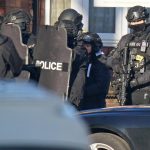The Manchester Arena bomber had links to a serious crime gang in the city, a senior member of MI5 has said.
The officer was giving evidence from behind a screen at the Manchester Arena Inquiry, detailing intelligence received by the security service about the bomber in the years before the attack on 22 May 2017.
“Witness J” explained how MI5 came close to re-opening their investigation into Salman Abedi and a meeting was due to take place nine days after the attack.
He also spoke about assessments made since the attack, which killed 22 people.
The officer, one of three director generals, gave evidence from inside a specially built wooden box to a court room at Manchester Magistrates’ Court, packed with members of the victims’ families and lawyers.
He told the inquiry: “We assess that Salman Abedi was part of a group of individuals in South Manchester who had links to a serious crime gang.
“The challenge for us is when individuals are involved in terrorism and crime, some of their behaviour and activity can look the same.
Manchester Airport: ‘No security threat’ after reports of suspicious package prompted Terminal 2 closure
Hunt for Marcus Rashford mural vandal: CCTV footage released by Greater Manchester Police
Marcus Rashford says honorary degree for fighting child poverty is ‘bittersweet’ after Universal Credit cuts
“It can be difficult to distinguish, for example drug dealing and fraud from national security activity.”
The officer described how a report by the Joint Analysis and Terrorism Centre (JTAC), a part of MI5, in 2010 highlighted the “close proximity between violent extremism and criminal gangs in Manchester”.
It also highlighted that individuals with a Libyan background could have been exposed to Libya-linked individuals with extremist tendencies from their parents’ generation, including members of the Libyan Islamic Fighting Group (LIFG) which has been linked to al Qaeda.
“Salman Abedi was assessed as likely his extreme views were informed by his father, Ramadan Abedi,” Witness J said.
Asked by Paul Greaney QC, for the inquiry, if it was assessed that Ramadan Abedi was involved with the LIFG, he said: “I’m afraid I am not able to go into that in open [hearings].”
Salman Abedi had first been on the MI5 radar in 2010, seven years before the attack, he was made a “subject of interest” in 2014, and was mentioned on several occasions in reporting to MI5 from mid-2015 onwards, including information about his support for ISIS.
On two separate occasions in the months before the attack, MI5 received intelligence that Abedi was involved in terrorism but dismissed it as criminal activity.
The intelligence is said to have been “highly relevant” to the planned attack but the significance was not “fully appreciated” at the time.
Sir John Saunders, the inquiry chairman, has ruled that there is “centrally important material” relevant to the question of whether MI5 could have prevented the attacks that cannot be revealed to the public.
As a result, for the first time in an inquest or inquiry since 9/11, some of the hearings will take place behind closed doors.
The inquiry is examining whether Salman Abedi should have been re-opened as a subject of interest in 2016, in light of what was known by MI5 and police at that time.
A second issue will be whether Abedi should have been re-opened as a subject of interest in the first few months of 2017 in response to information received on two occasions.
The last issue is whether Abedi should have been put on a “ports action” list in 2017 which would have alerted police to his return from Libya, four days before the attack.
The inquiry continues.






















